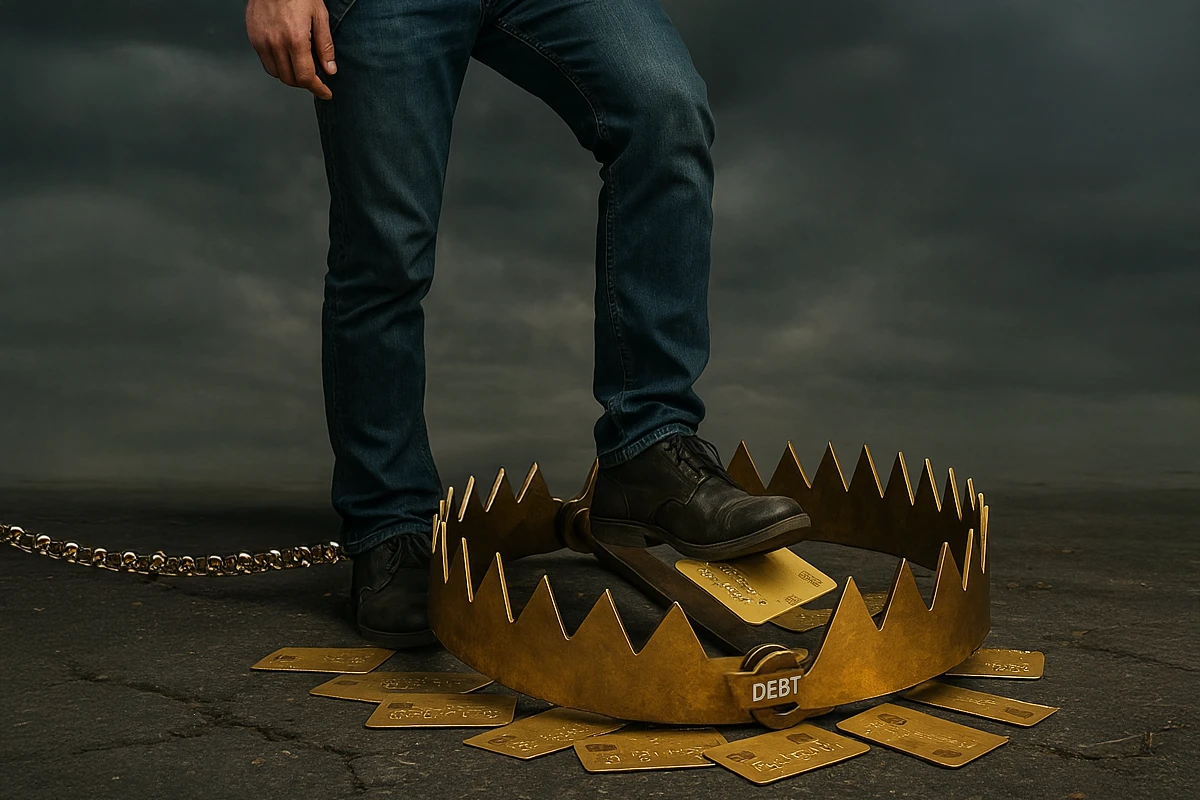Changing your money mindset.. easier said than done, am I right? You’ve read the blogs. You’ve saved the TikToks. You’ve nodded along to every “stop buying lattes” hot take and every “automate your savings” tip. And yet… your bank account still feels like it’s ghosting you.
Here’s the truth no one tells you: until your mindset shifts, your money won’t.
Financial advice is everywhere. But if your internal narrative is still stuck in scarcity—if you believe deep down that money is hard to earn, easy to lose, and never enough—then all the budgeting apps and investment guides in the world won’t change your reality.
Let’s talk about the real work: the emotional, psychological, and strategic shifts that turn money from a source of stress into a tool for power.
🧠 Scarcity Isn’t Just a Budget Problem—It’s a Belief System

Scarcity mindset sounds like:
“I’m just not good with money.”
“I’ll never make enough to get ahead.”
“I have to hustle constantly or I’ll fall behind.”
“I can’t afford to think long-term—I’m just trying to survive.”
Sound familiar? That’s not just financial anxiety—it’s a scarcity script. And it’s often inherited. Maybe you grew up watching your parents stress over bills. Maybe you were praised for being “low maintenance” or shamed for wanting more. Maybe you’ve internalized the idea that financial success is for other people—people with trust funds, tech jobs, or husbands who “handle all that.”
But here’s the kicker: scarcity mindset blocks strategy. It keeps you reactive instead of proactive. It makes you feel guilty for spending, afraid to invest, and overwhelmed by decisions that require long-term thinking.
💡 The Shift: From Fear to Framework

The moment your mindset shifts, everything changes. You stop seeing money as a mystery and start seeing it as a system. You stop asking “Can I afford this?” and start asking “Does this align with my goals?” You stop hoarding pennies and start building plans.
This is the shift from scarcity to strategy. And it’s not about being perfect—it’s about being powerful.
Here’s what that looks like:
1. From “I’m bad with money” → “I’m building financial skills”
You weren’t born knowing how to negotiate a salary or read a credit report. No one is. But you can learn. And every time you check your bank account, read a financial article, or ask a question, you’re building that skill set.
Money isn’t a personality trait—it’s a practice.
2. From “I’ll never make enough” → “I can increase my income”
Scarcity says your income is fixed. Strategy says you can negotiate, pivot, freelance, or build something new. You don’t have to settle. You can expand.
Even small shifts—asking for a raise, charging more for your services, starting a side hustle—are acts of abundance.
3. From “I have to hustle constantly” → “I deserve rest and wealth”
Scarcity glorifies burnout. Strategy prioritizes sustainability. You don’t have to earn rest. You don’t have to prove your worth through exhaustion. You can build systems that support you—automated savings, passive income, boundaries around work.
Wealth isn’t just about money—it’s about time, energy, and freedom.
💬 Why Advice Doesn’t Stick Until Your Mindset Does

You’ve probably heard all the “right” things:
“Track your spending.”
“Invest early.”
“Live below your means.”
“Build an emergency fund.”
“Don’t carry credit card debt.”
These tips are everywhere—on podcasts, in Instagram carousels, scribbled into planners. And they’re not wrong. They’re solid advice. But here’s the thing: advice is only useful if your mindset is ready to receive it.
If your internal dialogue is still whispering “I’ll never get ahead,” then those tips don’t feel empowering—they feel exhausting. They become just another list of things you’re “failing” at. You might start strong, color-code your budget, download the app, even set up auto-transfers—and then ghost your own goals three weeks later.
Why? Because changing your money mindset hasn’t happened yet. You’re still operating from a place of fear, guilt, or shame. And when those emotions are driving the bus, even the best advice gets rerouted.
You might avoid looking at your accounts—not because you’re irresponsible, but because you’re afraid of what you’ll find. You might feel shame every time you spend—even on things that bring you joy or support your well-being. You might sabotage your savings goals because deep down, you don’t believe you’re “the kind of person” who builds wealth.
This is what happens when your mindset is stuck in scarcity. It’s like trying to plant seeds in rocky soil. The tools are there, the intention is there—but nothing takes root.
Mindset is the filter through which all financial advice passes. If that filter is clogged with limiting beliefs, inherited money trauma, or internalized shame, then even the most strategic tips get distorted. “Track your spending” becomes “Obsess over every dollar and feel guilty for buying lunch.” “Invest early” becomes “I’m already behind, so why bother?” “Live below your means” becomes “I don’t deserve nice things.”
But when you start changing your money mindset, those same tips transform. They become tools of empowerment, not punishment. “Track your spending” becomes “I’m learning how I use money.” “Invest early” becomes “I’m building future freedom.” “Live below your means” becomes “I’m creating space for what matters most.”
The shift isn’t just intellectual—it’s emotional. It’s the moment you stop seeing money as a source of stress and start seeing it as a system you can navigate. It’s the moment you stop punishing yourself for past mistakes and start building a future with intention.
And that shift? It changes everything.
💪 Strategy Starts with Self-Trust

The most powerful money mindset shift? Believing that you are capable of managing, growing, and enjoying your money.
That means:
You trust yourself to make financial decisions.
You believe your goals are valid—even if they’re unconventional.
You know that mistakes are part of the process, not proof of failure.
You give yourself permission to want more—and to build it.
Changing your money mindset isn’t about becoming someone else—it’s about becoming more of who you already are. Strategic. Intentional. Empowered.
This shift doesn’t happen overnight. It happens in moments. The moment you say no to a purchase that doesn’t align. The moment you ask for what you’re worth. The moment you open a retirement account, even if you only put in $50.
Each moment builds momentum. And that momentum becomes mastery.
🧭 How to Start Changing Your Money Mindset Today

1. Audit Your Money Beliefs
This is your financial truth serum. Sit down with a journal and write out everything you believe about money—no filter. Things like:
“Money is hard to earn.”
“Rich people are greedy.”
“I’m just not good with numbers.”
“I’ll never be able to afford a house.”
Then interrogate each one:
Is this true? (Fact or fear?)
Is this helpful? (Does it move you forward or hold you back?)
Is this mine—or did I inherit it? (From family, culture, past experiences?)
This step is foundational to changing your money mindset because it reveals the subconscious scripts running the show. Once you name them, you can rewrite them.
2. Name Your Financial Goals
“Save more” is vague. “Build a $10K emergency fund by next summer” is a strategy. “Be better with money” is a wish. “Take a 3-month sabbatical in 2026 without touching my savings” is a plan.
When you name your goals with specificity, you activate your brain’s problem-solving mode. You start seeing opportunities, making aligned decisions, and tracking progress with purpose.
Changing your money mindset means shifting from vague hopes to clear, actionable intentions. Your goals become your compass—not your guilt trip.
3. Celebrate Small Wins
Every time you make a strategic money move—checking your account, saying no to impulse spending, negotiating a bill, transferring $50 to savings—celebrate it. Not with a shopping spree, but with acknowledgment: “I’m proud of myself.” “That was a smart move.” “I’m building something.”
Why? Because your brain thrives on positive reinforcement. Every celebration rewires your neural pathways to associate money with empowerment, not stress.
Changing your money mindset isn’t just about big breakthroughs—it’s about consistent, celebrated progress.
4. Surround Yourself With Abundance
Your environment shapes your beliefs. If your feed is full of fear-based financial takes or hustle culture burnout, it’s time to curate.
Follow creators who talk about money with clarity, compassion, and strategy. Read books that empower you (think We Should All Be Millionaires by Rachel Rodgers or The Psychology of Money by Morgan Housel). Talk to friends who are also changing their money mindset—who celebrate wins, share resources, and normalize financial growth.
Abundance isn’t just about money—it’s about mindset, energy, and community.
5. Forgive Your Past Financial Self
She did her best. She made choices with the information, tools, and emotional bandwidth she had. Maybe she overspent. Maybe she avoided her bank account. Maybe she stayed in a job too long or didn’t negotiate her worth.
But now? You know more. You’re doing better. That’s growth.
Changing your money mindset means releasing shame and embracing evolution. You’re not behind—you’re becoming.
🔁 Practice, Not Perfection
This isn’t a one-and-done transformation. It’s a daily practice. Some days you’ll feel powerful. Other days you’ll feel stuck. That’s normal.
The goal isn’t perfection—it’s progress. It’s showing up for your financial life with curiosity, compassion, and commitment. It’s choosing strategy over shame, clarity over chaos, and self-trust over self-doubt.
Changing your money mindset is the most important investment you’ll ever make. And you’re already doing it.
💬 Final Thoughts: You’re Not Bad With Money—You’re Becoming Brilliant
You don’t need to be perfect. You don’t need to have it all figured out. You just need to start changing your money mindset—from scarcity to strategy. From fear to framework. From shame to self-trust.
Because once your mindset changes, your money follows. And that’s when the advice starts to stick. That’s when the budget becomes a blueprint. That’s when the savings account becomes a source of pride. That’s when you stop surviving and start building.
Changing your money mindset is the most powerful financial move you’ll ever make. And you’re ready.









